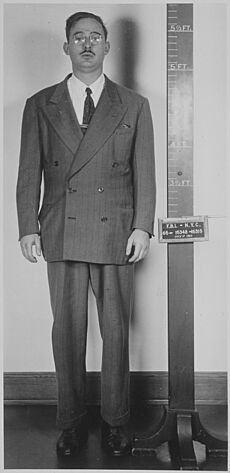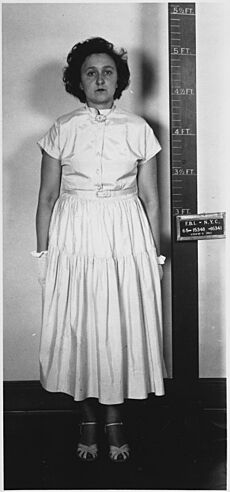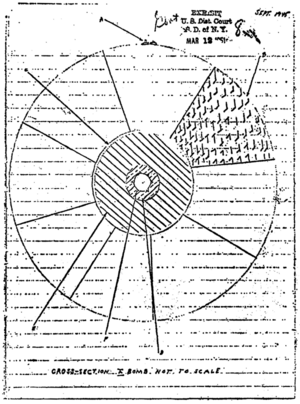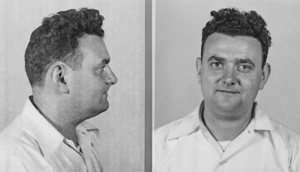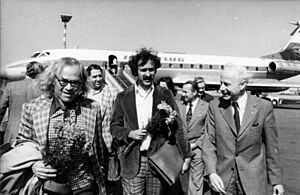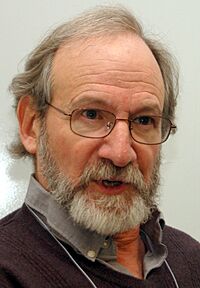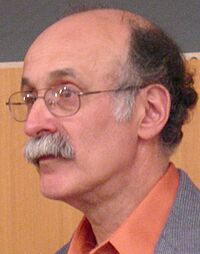Julius and Ethel Rosenberg facts for kids
Quick facts for kids
Julius and Ethel Rosenberg
|
|
|---|---|
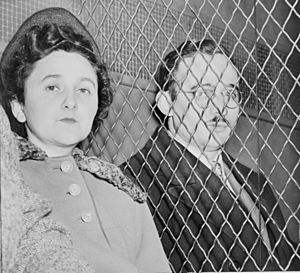
Ethel and Julius Rosenberg in 1951
|
|
| Born |
|
| Died |
|
| Cause of death | Execution by electrocution |
| Resting place | Wellwood Cemetery, New York, U.S. |
| Criminal status | Executed (June 19, 1953) |
| Children |
|
| Conviction(s) | Conspiracy to commit espionage (50 U.S.C. § 32) |
| Criminal penalty | Death by electrocution |
Julius Rosenberg (born May 12, 1918) and Ethel Rosenberg (born September 28, 1915) were an American married couple. They became famous during the Cold War for being accused of espionage, which means spying. They were charged with sharing top-secret information about American weapons and technology with the Soviet Union. This information included details about radar, sonar, jet propulsion engines, and even nuclear weapon designs.
In 1951, they were found guilty of spying. Two years later, in 1953, they were executed by the United States government. This happened at Sing Sing prison in Ossining, New York. They were the first American civilians to be executed for spying during a time of peace. Other people involved in the spy ring, like Ethel's brother David Greenglass, were sent to prison.
For many years, some people, including the Rosenbergs' two sons, believed that Julius and Ethel were innocent. They thought the couple were victims of the strong fear of communism during the Cold War. However, when the U.S. government later released secret documents, these papers seemed to show that Julius was indeed a spy. He acted as a messenger and helped recruit others. The documents also suggested that Ethel helped her brother David join the spy group and did office tasks like typing secret papers.
Contents
Early Lives and Education

Julius Rosenberg was born in New York City on May 12, 1918. His family were Jewish immigrants from the Russian Empire. When Julius was 11, his family moved to the Lower East Side of New York. He went to Seward Park High School. While studying electrical engineering at City College of New York, Julius became a leader in the Young Communist League USA. This was during the Great Depression. He graduated in 1939.
Ethel Greenglass was born in Manhattan on September 28, 1915. She also came from a Jewish family and had a brother named David Greenglass. Ethel first wanted to be an actress and singer. But she later got a secretarial job at a shipping company. She became involved in workers' rights groups and joined the Young Communist League. This is where she met Julius in 1936. They got married in 1939.
Espionage Activities
In 1940, Julius Rosenberg started working as an engineer for the United States Army Signal Corps. This was at Fort Monmouth, New Jersey. He worked there until 1945. He was let go when the U.S. Army found out he had been a member of the Communist Party USA. During World War II, important research on electronics, communications, radar, and guided missiles happened at Fort Monmouth.
According to a book by his former contact, Julius was recruited to spy for the Soviet Union in 1942. At this time, the Soviet Union was an ally of the United States. Julius was accused of giving thousands of secret reports to the Soviets. These included information about a special fuse. He also reportedly helped recruit other people to spy for the Soviets.
One of these people was William Perl, who gave thousands of documents to the Soviets. These documents included designs for the Lockheed P-80 Shooting Star. This was the first U.S. jet fighter. Julius also learned that Ethel's brother David was working on the top-secret Manhattan Project. This project was building the first atomic bomb. Julius was told to recruit David to spy.
In 1944, Julius also recruited another engineer named Russell McNutt. McNutt worked on designs for plants that made materials for atomic weapons. For this, Julius reportedly received a bonus.
The U.S. did not share its atomic bomb secrets with the Soviet Union. The Soviets surprised the world by testing their first atomic bomb in 1949. Some people believed the Rosenbergs' spying helped the Soviets build their bomb faster. However, others argue that the Soviets developed their bomb mostly on their own.
The Rosenberg Case
Arrest and Investigation
In January 1950, the U.S. found out that a German scientist named Klaus Fuchs had given atomic secrets to the Soviets. Fuchs named his messenger as Harry Gold. Gold was arrested in May 1950. On June 15, 1950, David Greenglass, Ethel's brother, was arrested by the FBI for spying. He soon admitted to passing secret information to the Soviets through Gold.
David also claimed that Julius Rosenberg had convinced David's wife, Ruth, to recruit him. He said this happened during a visit in 1944. David said Julius had passed secrets. This connected Julius to a Soviet agent. This link was important for the government to try and convict the Rosenbergs.
On July 17, 1950, Julius was arrested because of David Greenglass's confession. On August 11, 1950, Ethel was arrested after she spoke to a special jury called a grand jury.
Another person involved, Morton Sobell, tried to escape to Mexico City. He was later arrested and brought back to the U.S.
Grand Jury and Changed Stories
High-ranking government officials met secretly in February 1950 to talk about the Rosenberg case. They wanted to put pressure on Julius to get him to talk. The FBI director, J. Edgar Hoover, wrote that going after Ethel would be a way to make Julius speak.
The case against Ethel became stronger just before the trial. David and Ruth Greenglass were interviewed again. They changed their original stories. David first said he gave atomic data to Julius on a New York street. Later, he said he gave it to Julius in the Rosenbergs' apartment. He also said Ethel typed up his notes. Ruth also said that Ethel typed the information. After this new testimony, all charges against Ruth were dropped.
On August 11, Ethel spoke to the grand jury. She refused to answer questions, using her right to remain silent. FBI agents arrested her as she left the courthouse. Her lawyer asked for her to be released temporarily so she could arrange care for her two young children. This request was denied. Both Julius and Ethel were pressured to name other spies. But they did not give any more information. On August 17, the grand jury officially charged Julius and Ethel Rosenberg, David Greenglass, and the Soviet agent.
Trial and Conviction
The trial of the Rosenbergs and Sobell began on March 6, 1951. It took place in a federal court in New York. Judge Irving Kaufman was in charge. The main witness for the prosecution was David Greenglass. He said he gave Julius a drawing of the inside of an atomic bomb. This was the "Fat Man" bomb, which was dropped on Nagasaki, Japan.
On March 29, 1951, the Rosenbergs were found guilty of spying. On April 5, they were sentenced to death. The law stated that anyone found guilty of giving national defense information to a foreign government could face life in prison or death.
Judge Kaufman said he believed the Rosenbergs were responsible not only for spying but also for American deaths in the Korean War. He said their actions had "altered the course of history."
The U.S. government offered to spare Julius and Ethel's lives if Julius would name other spies and they both admitted their guilt. But the Rosenbergs refused. They said they would not lie, even if it meant death.
After the Conviction
Efforts to Save Them
After the trial, some Americans began to believe the Rosenbergs were innocent or that their sentence was too harsh. Especially for Ethel. A campaign started to try and stop their execution. There were many protests and claims that the trial was unfair.
Around the world, especially in Europe, many people protested. Famous people like Albert Einstein and Pablo Picasso asked President Harry S. Truman and later President Dwight D. Eisenhower to pardon the Rosenbergs. Even Pope Pius XII asked Eisenhower to spare them. But President Eisenhower refused all requests.
Execution
The execution was first set for June 18, 1953. But it was delayed for a day. The Rosenbergs' lawyer asked for more time, saying that executing them on the Jewish Sabbath would be wrong. The judge then rescheduled the execution for earlier on June 19, before the Sabbath began.
On June 19, 1953, Julius was executed by electric shock. Ethel's execution was more difficult. After the first shocks, doctors found her heart was still beating. Two more shocks were given. The Rosenbergs were the only American civilians executed for spying during the Cold War.
Their funeral was held in Brooklyn on June 21. They were buried at Wellwood Cemetery.
Soviet Atomic Program
Some people debated how much the Soviet spy ring helped the Soviet Union build its atomic bomb. Senator Daniel Patrick Moynihan believed that the information from spies helped the Soviets build their bomb in four years instead of five.
Nikita Khrushchev, who led the Soviet Union later, wrote that the Rosenbergs "had provided very significant help" in speeding up their atomic bomb production. However, a Soviet engineer named Boris V. Brokhovich disagreed. He said the Soviets developed their own bomb and got "nothing from the Rosenbergs." Julius's contact, Feklisov, also said Julius didn't understand the atomic bomb and couldn't give useful information about it.
Later Information
1995 Venona Decryptions
The Venona project was a secret U.S. program that decoded messages from Soviet intelligence agencies. These messages were not used in the Rosenbergs' trial. But they later gave more information about the case.
In 1995, the U.S. government made many Venona documents public. These showed Julius Rosenberg's role as part of a spy group. For example, a 1944 message mentioned that Ruth Greenglass's husband, David, was being recruited as a spy by his sister (Ethel) and her husband (Julius). The message also showed that Julius had his own spy codename. Later, in 2009, more KGB messages were released. These showed that both Ethel and Julius had regular contact with KGB agents. They were also active in recruiting David Greenglass and Russell McNutt.
2001 David Greenglass's New Statements
In 2001, David Greenglass changed his story about his sister Ethel typing the notes. He said, "I frankly think my wife did the typing, but I don't remember." He admitted he gave false testimony to protect himself and his wife. He said he didn't realize the government would seek the death penalty for Ethel.
2008 Grand Jury Testimony Released
In 2008, more grand jury testimony was released. Ruth Greenglass had told the grand jury that she wrote down the information for Julius. But at the trial, she said Ethel typed it.
A former prosecutor, William P. Rogers, said they pushed for Ethel's death sentence to try and make Julius confess fully. He said Ethel "called our bluff" because she didn't pressure her husband to talk.
2008 Morton Sobell's Statements
In 2008, Morton Sobell was interviewed. He admitted that he had given documents to the Soviets. He said these were about radar and weapons, not the atomic bomb. He confirmed that Julius Rosenberg was involved in a spy group that gave military information to the Soviets. But he said Julius never told him about atomic bomb spying.
Sobell also believed that the atomic bomb diagrams from Greenglass were not very useful to the Soviets. He thought Ethel Rosenberg knew about her husband's spying but didn't take part in it herself.
2009 KGB Archives Information
In 2009, notes from KGB archives were made public. These notes showed that the KGB considered Julius Rosenberg an effective spy. They also saw Ethel as someone who supported his work. According to these notes, Julius and Ethel worked directly with KGB agents. They were also the ones who recruited Greenglass and McNutt for the atomic bomb spying mission.
The Rosenberg Children
The Rosenbergs' two sons, Michael and Robert, spent many years trying to prove their parents were innocent. After their parents' execution, they were adopted by the activist Abel Meeropol and his wife. They took the Meeropol last name.
After Morton Sobell's confession in 2008, the sons accepted that their father was involved in spying. However, they still believe the case had problems with how it was handled. They also think their mother was found guilty with weak evidence, just to pressure their father. They do not believe either of their parents deserved the death penalty.
Michael and Robert wrote a book about their family called We Are Your Sons (1975). Robert also wrote a memoir called An Execution in the Family (2003). In 1990, he started the Rosenberg Fund for Children. This group helps children of activists. Michael's daughter, Ivy Meeropol, made a documentary about her grandparents in 2004.
Today, the sons believe Julius was legally guilty of the conspiracy charge, but not of atomic spying. They think Ethel only generally knew about his activities. They continue to ask for Ethel to be officially cleared of the charges after her death. In 2015, they asked President Barack Obama to say that Ethel's conviction and execution were wrong. They continue to campaign for this.
Artistic Representations
- The song "Julius and Ethel" by Bob Dylan (1983) is about the Rosenberg case.
- There is a memorial in Havana, Cuba, with images of the Rosenbergs.
- Pakistani poet Faiz Ahmad Faiz wrote a poem about Julius and Ethel Rosenberg.
See also
 In Spanish: Ethel y Julius Rosenberg para niños
In Spanish: Ethel y Julius Rosenberg para niños
- Atomic spies
- Capital punishment by the United States federal government
- List of people executed by the United States federal government
- Soviet atomic bomb project
 | Percy Lavon Julian |
 | Katherine Johnson |
 | George Washington Carver |
 | Annie Easley |


